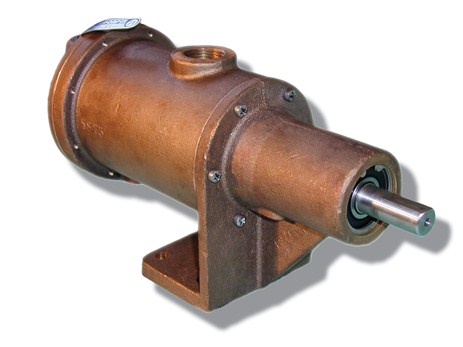PT FTS Indonesia
These pump housings and mounting brackets are made from cast aluminum or bronze alloy. The rotor is made from stainless steel with a hard chrome plate for improved wear properties. The stator is made from molded Nitrile. The mechanical seal is a carbon and ceramic rotary face for positive sealing.
Gear Pumps Bronze 121
The turning of the helical shaped rotor within the stationary stator creates a progressing cavity similar to a moving piston. Liquid is thus displaced generating a pumping action. Unlike piston pumping, extremely high pressure cannot be created because the stator is made of Nitrile and is flexible. Because of this flexibility, contaminated liquids can be handled. High starting torque motors are recommended in order to overcome the high starting friction of the stator.
FEATURES
- Pipe Size ¾
- All Bronze or Corrosion Resistant Aluminum Construction
- Heavy Duty Ball Bearings
- Designed for Pulley Drive Applications
- Quiet Running
- Can Handle Contaminated Liquids
- Carbon Face Mechanical Seal
- Nitrile Stator and Stainless Steel Rotor
DRIVE
This pump has a bare shaft and is designed for pulley drive applications or direct coupled to an electric motor. Viscous or thick liquids must be pumped at slower speeds as indicated in the specifications table. Speed reduction from standard electric motor speed can be obtained by pulleys in the direct ratio of speed reduction desired – large pulley on pump, small pulley on motor. Heavy liquids can be pumped at higher speeds, but require more horsepower in direct amount to their specific gravity. For example, a liquid with a specific gravity of 1.3 would require 1.3 times the original horsepower.
LIQUIDS & TEMPERATURES
The corrosion resistant alloys used are compatible with common liquids including water, water solutions, oils and many commercial chemicals. Severe solvents are not compatible with the Nitrile and should not be pumped. Viscous liquids can be pumped, but at slower speeds. Samples of liquids, viscosity and recommended pump shaft R.P.M. are given on this page. Contaminated liquids can be pumped because of the flexible Nitrile stator.
SUCTION LIFT
Close fit of the rotor within the stator permits lifting of liquid on the suction side as high as 20 ft. high starting torque motors are recommended in order to overcome the high starting friction of the stator.
ROTATION
This helical rotor design demands a single rotation – clockwise when facing the pump drive shaft. Pump rotation and “in” and “out” ports are indicated on the dimension diagrams.
Order Enquiry Form
Contact form description text





